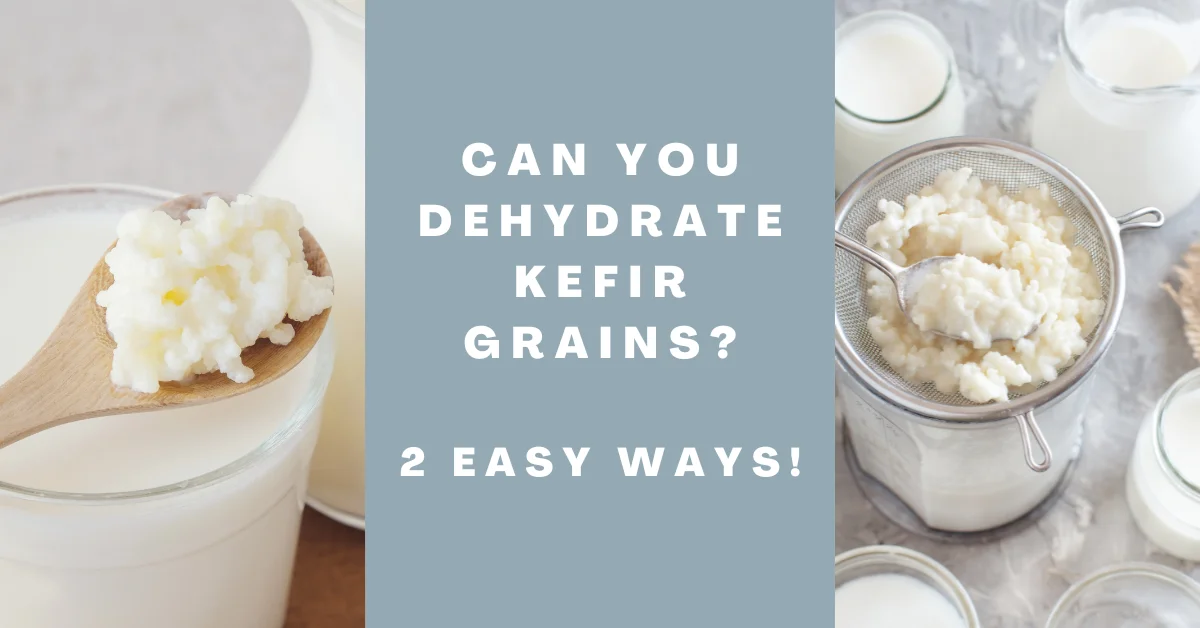Nobody’s a stranger to the benefits of kefir. The only problem is that sometimes there is just too much kefir. When temperatures drop, kefir grains can get out of hand, quite literally. Due to this concern, many of you might wonder, can you dehydrate kefir grains? Dehydrating them will stop their growth and increase their shelf life!
Yes! You can absolutely dehydrate kefir grains. In fact, you can do it easily both with and without using a dehydrator. Remember to rinse the grains with non-chlorinated water or milk, then dehydrate on the lowest setting.
Instead of possibly overflowing your refrigerator with kefir, you can dehydrate and store it to enjoy.
How do you dehydrate kefir grains?
Dehydrating kefir grains doesn’t take really long and is an easy process. You can easily create a kefir backup that will last you a year! Using a dehydrator is one of the easiest ways to dehydrate your kefir grains.
How do you dehydrate kefir grains in a dehydrator?
Step 1: Rinse the grains
Rinse your kefir grains with either milk or water. Make sure that the water you use is non-chlorinated and filtered.
Step 2: Place the grains on the dehydrator sheet
Place your rinsed kefir grains on a dehydrator (Paraflex) sheet.
Step 3: Set up your dehydrator
Place your kefir grains with the dehydrator sheet in the dehydrator. Set your dehydrator on the lowest setting.
Step 4: Wait patiently
Let the kefir grains get rid of moisture for 3-4 hours in the dehydrator.
Step 5: Check for moisture
If there is still some moisture, then grant the grains one to two additional hours. Go with your judgment on this. It’s best to keep it for an hour more and check again to avoid overdrying.
Step 6: Bag them up
Now that the kefir grains are dry place them in an airtight bag and put them in the fridge or freezer. If you have milk kefir grains, then a pro tip is to put them in powdered milk to protect them from the freezer.
How do you air dry kefir grains?
Step 1: Rinse your grains
Rinse your kefir grains with non-chlorinated water. Mineral water is fine too. If you are working with milk kefir, then use milk to rinse it.
Step 2: Lay the grains out
Now, lay your kefir grains on either wax paper or parchment paper. If you don’t have one of these sheets, you can also use a shallow dish. The idea here is to keep them at a distance to air them out.
Step 3: Cover them up
Choose a breathable lid to cover up your laid-out kefir grains. Covering them up will ensure that nothing bad from the environment will enter your kefir grains.
Step 4: Wait for them to dry
Keep your kefir grains for 2-3 days and let them dry at room temperature. After that, flip them over carefully and give them another one to two days. After around 4 or 5 days, your kefir grains will be fully dry and ready to be stored.
Step 5: Store them up
Now that the kefir grains are dry put them in a bag and place them in the refrigerator or freezer. In case you have milk kefir, then put them into powdered milk.
How to store dehydrated kefir grains?
To store kefir grains, dry them for an additional 12 to 24 hours. After that, place them in a zip lock bag and place them in the freezer or refrigerator. If you are using milk kefir grains, then make sure to keep them in powdered milk. This way, you can store your kefir grains for up to 6-12 months.
How do you rehydrate kefir grains?
To rehydrate kefir grains:
- Place them in a jar and pour 250ml of non-chlorinated water into it.
- Mix, cover, and let the mixture rest for 2 hours at room temperature.
- Then, using a sieve, wash the mixture with lukewarm water.
Reactivating kefir grains
After rehydration, you need to reactivate your kefir grains. To do so, follow the steps below!
Day 1 to 7 of reactivation
The following steps should take place over a period of 7 days.
- Put the milk kefir grains in a jar.
- Put half a cup of milk (125ml) in your kefir grains and cover the jar.
- Let the grains sit at room temperature for 8 hours.
- After that, mix the grains on a regular basis by shaking the jar. This will ensure that the milk comes into contact with the grains properly.
- Wait for 24 hours, then rinse the grains with warm water and filter them using a sieve. Repeat every day.
Note: Never use hot water! It will kill your grains.
- Begin taste testing on day 3. You can drink your milk kefir once its taste and smell are good (usually by the 5th day). Plus, double the milk when you see that the fermentation has begun (between day 3 and day 5).
- If you think your milk kefir is becoming too acidic or coagulated after 24 hours or less, then either remove half the amount of your kefir grains or double the milk.
Day 7 onwards
- You don’t have to rinse the grains anymore. Just make sure to milk them regularly.
- After a month has passed, your grains will be thicker. This is because the grains start multiplying properly after 4 weeks.
How long do dehydrated kefir grains last?
Dehydrated kefir will last you for up to 6-12 months! You can dehydrate a large amount of kefir and use it all year round with your favorite recipes.
Related FAQs to kefir grains
How long will kefir grains last in the fridge?
Kefir grains can last for three weeks in the fridge if you keep adding milk after breaks, and store them in a jar with a tight lid.
Apart from kefir grains, you might also be interested in dehydrating dates at home!
What can I do with too much water kefir grains?
You can just remove the excess grains as they can cause the sugar water to ferment too quickly, which may lead to grain deterioration.
Why are my water kefir grains disintegrating?
Water kefir grains can disintegrate due to over-culturing. To avoid this, shorten the culturing time when the temperatures are warm, and keep shifting the grains to fresh sugar water more frequently than before.
Concluding our thoughts on dehydrating kefir grains!
Kefir grains are amazing for your gut health. Consuming them will keep you in tip-top condition. However, they become too burdensome to store and manage.
The answer to your struggles is dehydrating kefir grains to control their growth! There are multiple effective at-home methods for that. The best way is to use a dehydrator to dehydrate the kefir grains. Use the mentioned methods and enjoy your favorite kefir recipes all year round!



